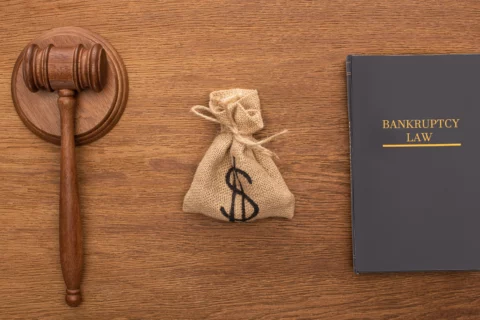What Does Chapter 7 Bankruptcy Involve?
When compared to other bankruptcy forms, filing bankruptcy Chapter 7 is considered by most as the simplest and quickest. A successful bankruptcy filing can wipe out different types of debt. This means that the debtor will no longer need to repay debts that he or she owes from creditors.
While not all of your debt problems will be eliminated when you file bankruptcy, it can help you eliminate certain forms of debt and free up a sufficient budget for you to pay back non-dischargeable debts. Consult with experienced Aurora bankruptcy lawyers with extensive experience in handling bankruptcy cases. They can provide legal advice on how you can obtain debt relief and rebuild your financial future.
An Overview of Filing for Bankruptcy Under Chapter 7
 A liquidation bankruptcy petition is especially useful in eliminating unsecured debt. Generally, unsecured debts are debts without collateral. These may include credit card bills, medical bills, and personal debts. In contrast, certain types of debt are non-dischargeable, like certain tax debt, criminal fines and penalties, child support, alimony, and student loan debt.
A liquidation bankruptcy petition is especially useful in eliminating unsecured debt. Generally, unsecured debts are debts without collateral. These may include credit card bills, medical bills, and personal debts. In contrast, certain types of debt are non-dischargeable, like certain tax debt, criminal fines and penalties, child support, alimony, and student loan debt.
Once your bankruptcy petition has been approved by the bankruptcy court, an automatic stay takes effect. An automatic stay ensures that creditors will not sue you for failure to pay back what you owe. It can also stop creditor harassment and wage garnishment.
One downside of declaring bankruptcy can be seen in the way it affects your credit report. During and even after the bankruptcy process, you will find it more difficult to get credit. Despite this, however, you would be able to notice a slow but steady recovery of your credit score a few months after filing a bankruptcy petition.
Qualifications for Filing Chapter 7
Before you can file bankruptcy, some qualifications must be met. These include the following:
- You must be able to pass the bankruptcy means test, which looks into your monthly income and living expenses.
- There must be no recently filed Chapter 7 or Chapter 13 bankruptcy petition.
- You will not be allowed to file a petition in bankruptcy if your previous petition has been denied due to non-compliance with a bankruptcy court order or failure to appear in court.
Trusted Aurora bankruptcy attorneys can explain these qualifications in more detail.
How to File a Petition for Bankruptcy
The liquidation bankruptcy procedure will take more or less six months to complete. Below are some of the steps that must be taken to have a successful bankruptcy proceeding:
Hire a credible bankruptcy attorney
If you are struggling with debt and financial problems, consulting a trusted local attorney is highly advisable. It must be noted that failure to provide all the required paperwork may result in the dismissal of your bankruptcy case.
Undergo credit counseling
A bankrupt filer should have completed counseling with a certified nonprofit credit counseling provider before declaring bankruptcy.
Prepare all the necessary forms and supporting documents
All the necessary paperwork related to your debts, personal property, and finances must be complete and must comply with relevant bankruptcy rules.
Work with your bankruptcy trustee
The court will assign a trustee that will evaluate your bankruptcy case. After determining eligibility bankruptcy trustees will confirm if filers are qualified for Chapter 7 or not. He or she will also manage the transactions between you and any creditor concerned.
Attend the meeting of creditors
A meeting between the debtor and the creditors will be organized by the trustee in bankruptcy cases. You have to respond to any questions regarding your finances.
Liquidate nonexempt assets
The assigned trustee will be liquidating your assets and distribute the funds to your creditors. Most bankruptcy filings under Chapter 7, however, are ‘no asset’ cases.
Settle secured debts
Assets held as collateral can be repossessed to settle a secured debt. If you wish to keep the collateral and avoid repossession, you must be able to allocate money to repay what is owed.
Complete the required financial management course
A financial education course from a certified credit counseling organization is necessary before obtaining a bankruptcy discharge.
Obtain a bankruptcy discharge
Behind the majority of filings is the desire to benefit from discharged debts, where all qualifying debts are forgiven or wiped out. This often takes place around three to six months after filing bankruptcy.
Seeking Legal Advice for Your Bankruptcy Declaration
Chapter 7 bankruptcy is ideal for filers who do not own a lot of properties whose debts are greater than their annual salary. If most of your financial problems are unsecured debts, like medical debt and credit card debt, Chapter 7 will be able to wipe out these types of debt.
Filing for bankruptcy allows you to have a fresh start with your finances. However, it is best to consult a hands-on Aurora bankruptcy lawyer. Before filing bankruptcy, seek legal help from a trusted bankruptcy law firm. Call us at Cutler Law for legal representation and assistance.


